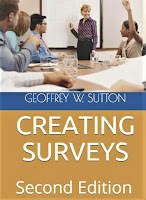Scale name: Mathematics Self-Efficacy and Anxiety Questionnaire (MSEAQ)
Scale
overview: The
Mathematics Self-Efficacy and Anxiety Questionnaire (MSEAQ) is a 29-item self-report measure of both mathematics self-efficacy and mathematics anxiety.
Author: Diana Kathleen May
Response
Type: Items are
rated on a 5-point Likert-type scale following a “no response” option:
1 = Never
2 = Seldom
3 = Sometimes
4 = Often
5 = usually
Sample
items
1. I feel confident enough to ask questions in my mathematics class.
6. I worry that I will not be able to get a good grade in my mathematics course.
Subscales
and basic statistics for the MSEAQ
Self-Efficacy
M = 44.11, SD = 10.78, alpha = .93
Anxiety M
= 46.47, SD = 12.61, alpha = .93
Total Scale
M = 90.58, SD = 22.78, alpha = .96
Reliability: See the Cronbach’s alpha levels
reported above.
Validity: There were significant positive
correlations with similar measures. The results of a Factor Analysis are
included in the dissertation.
Availability: The scale is in Appendix B of May’s dissertation at the University of Georgia.
A pdf link:
http://getd.libs.uga.edu/pdfs/may_diana_k_200908_phd.pdf
Permissions- Generally users should contact the author unless permission to use a measure has been stated. Many authors permit free use of measures for the purposes of research and education.
Sharing: Please share this post and blog to others interested in tests and statistics. Thank you.
Reference
for the scale
May, D.K. (2009). Mathematics Self-Efficacy and Anxiety Questionnaire [University of
Georgia]. http://getd.libs.uga.edu/pdfs/may_diana_k_200908_phd.pdf
Reference
for using scales in research:
Buy Creating Surveys on
Reference
for clinicians on understanding assessment
Buy Applied Statistics for Counselors
👉 Resource Link: A – Z Test Index
These related scales may be of interest
Abbreviated Math Anxiety Scale AMAS
Academic Self-Efficacy for Students ASESS
Academic Self-Efficacy Scale ASE
General Self-Efficacy Scale GSE
SUPPORT
Please Checkout My Website www.suttong.com
See my Books
FOLLOW me on
FACEBOOK Geoff
W. Sutton
TWITTER @Geoff.W.Sutton
PINTEREST www.pinterest.com/GeoffWSutton
Read published articles:
Academia Geoff
W Sutton
ResearchGate Geoffrey W Sutton



Comments
Post a Comment